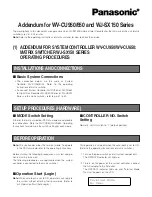
C
HAPTER
17
| Multicast Filtering
Layer 2 IGMP (Snooping and Query for IPv4)
– 617 –
network segments where no node has expressed interest in receiving a
specific multicast service. For switches that do not support multicast
routing, or where multicast routing is already enabled on other switches in
the local network segment, IGMP Snooping is the only service required to
support multicast filtering.
When using IGMPv3 snooping, service requests from IGMP Version 1, 2 or
3 hosts are all forwarded to the upstream router as IGMPv3 reports. The
primary enhancement provided by IGMPv3 snooping is in keeping track of
information about the specific multicast sources which downstream
IGMPv3 hosts have requested or refused. The switch maintains information
about both multicast groups and channels, where a group indicates a
multicast flow for which the hosts have
not
requested a specific source (the
only option for IGMPv1 and v2 hosts unless statically configured on the
switch), and a channel indicates a flow for which the hosts have requested
service from a specific source. For IGMPv1/v2 hosts, the source address of
a channel is always null (indicating that any source is acceptable), but for
IGMPv3 hosts, it may include a specific address when requested.
Only IGMPv3 hosts can request service from a specific multicast source.
When downstream hosts request service from a specific source for a
multicast service, these sources are all placed in the Include list, and traffic
is forwarded to the hosts from each of these sources. IGMPv3 hosts may
also request that service be forwarded from any source except for those
specified. In this case, traffic is filtered from sources in the Exclude list,
and forwarded from all other available sources.
N
OTE
:
When the switch is configured to use IGMPv3 snooping, the
snooping version may be downgraded to version 2 or version 1, depending
on the version of the IGMP query packets detected on each VLAN.
N
OTE
:
IGMP snooping will not function unless a multicast router port is
enabled on the switch. This can accomplished in one of two ways. A static
router port can be manually configured (see
"Specifying Static Interfaces
for a Multicast Router" on page 622
). Using this method, the router port is
never timed out, and will continue to function until explicitly removed. The
other method relies on the switch to dynamically create multicast routing
ports whenever multicast routing protocol packets or IGMP query packets
are detected on a port.
N
OTE
:
A maximum of up to 255 multicast entries can be maintained for
IGMP snooping. Once the table is full, no new entries are learned. Any
subsequent multicast traffic not found in the table is dropped if
unregistered-flooding is disabled (default behavior) and no router port is
configured in the attached VLAN, or flooded throughout the VLAN if
unregistered-flooding is enabled (see
"Configuring IGMP Snooping and
Query Parameters" on page 618
).
Static IGMP Router Interface – If IGMP snooping cannot locate the IGMP
querier, you can manually designate a known IGMP querier (i.e., a
multicast router/switch) connected over the network to an interface on
your switch (
page 622
). This interface will then join all the current
multicast groups supported by the attached router/switch to ensure that
multicast traffic is passed to all appropriate interfaces within the switch.
Summary of Contents for ECS3510-10PD
Page 1: ...Management Guide www edge core com 10 Port Layer 2 Fast Ethernet Switch...
Page 2: ......
Page 4: ......
Page 48: ...CONTENTS 48...
Page 68: ...SECTION I Getting Started 68...
Page 78: ...CHAPTER 1 Introduction System Defaults 78...
Page 96: ...CHAPTER 2 Initial Switch Configuration Managing System Files 96...
Page 98: ...SECTION II Web Configuration 98...
Page 118: ...CHAPTER 3 Using the Web Interface Navigating the Web Browser Interface 118...
Page 150: ...CHAPTER 4 Basic Management Tasks Resetting the System 150...
Page 196: ...CHAPTER 5 Interface Configuration VLAN Trunking 196 Figure 66 Configuring VLAN Trunking...
Page 238: ...CHAPTER 7 Address Table Settings Configuring MAC Address Mirroring 238...
Page 264: ...CHAPTER 8 Spanning Tree Algorithm Configuring Interface Settings for MSTP 264...
Page 274: ...CHAPTER 9 Congestion Control Automatic Traffic Control 274...
Page 288: ...CHAPTER 10 Class of Service Layer 3 4 Priority Settings 288...
Page 304: ...CHAPTER 11 Quality of Service Attaching a Policy Map to a Port 304...
Page 424: ...CHAPTER 13 Security Measures DHCP Snooping 424...
Page 568: ...CHAPTER 14 Basic Administration Protocols OAM Configuration 568...
Page 596: ...CHAPTER 15 IP Configuration Setting the Switch s IP Address IP Version 6 596...
Page 614: ...CHAPTER 1 IP Services Configuring the PPPoE Intermediate Agent 614...
Page 784: ...CHAPTER 20 System Management Commands Powered Device 784...
Page 814: ...CHAPTER 22 Remote Monitoring Commands 814...
Page 1008: ...CHAPTER 26 Interface Commands Power Savings 1008...
Page 1022: ...CHAPTER 27 Link Aggregation Commands Trunk Status Display Commands 1022...
Page 1052: ...CHAPTER 29 Congestion Control Commands Automatic Traffic Control Commands 1052...
Page 1064: ...CHAPTER 31 UniDirectional Link Detection Commands 1064...
Page 1070: ...CHAPTER 32 Address Table Commands 1070...
Page 1130: ...CHAPTER 34 ERPS Commands 1130...
Page 1172: ...CHAPTER 35 VLAN Commands Configuring Voice VLANs 1172...
Page 1186: ...CHAPTER 36 Class of Service Commands Priority Commands Layer 3 and 4 1186...
Page 1302: ...CHAPTER 38 Multicast Filtering Commands MVR for IPv6 1302...
Page 1368: ...CHAPTER 40 CFM Commands Delay Measure Operations 1368...
Page 1390: ...CHAPTER 42 Domain Name Service Commands 1390...
Page 1448: ...CHAPTER 44 IP Interface Commands ND Snooping 1448...
Page 1450: ...SECTION IV Appendices 1450...
Page 1455: ...APPENDIX A Software Specifications Management Information Bases 1455 UDP MIB RFC 2013...
Page 1456: ...APPENDIX A Software Specifications Management Information Bases 1456...
Page 1482: ...COMMAND LIST 1482...
Page 1493: ......
















































